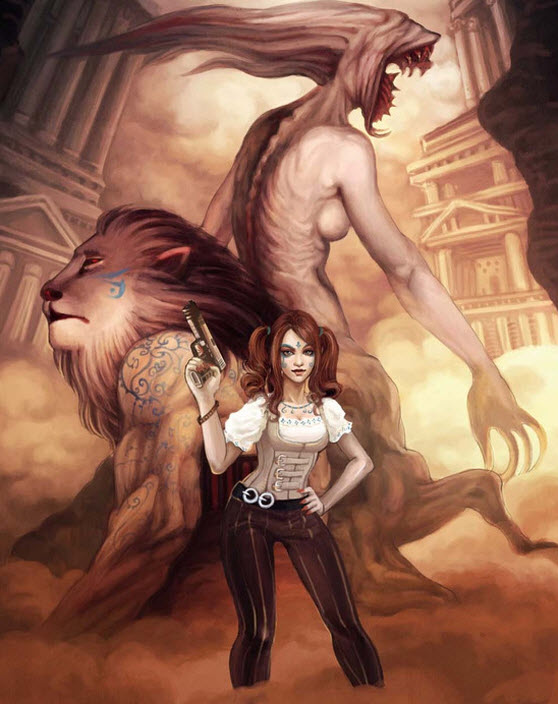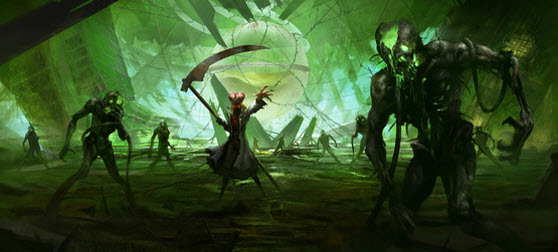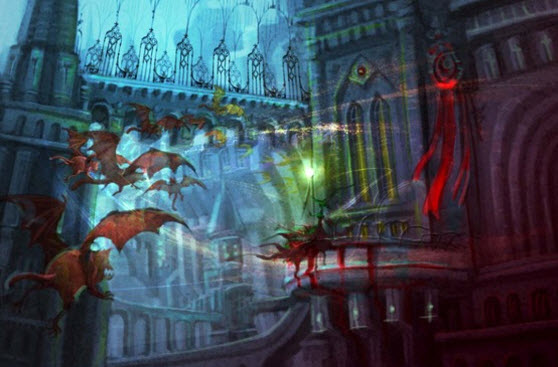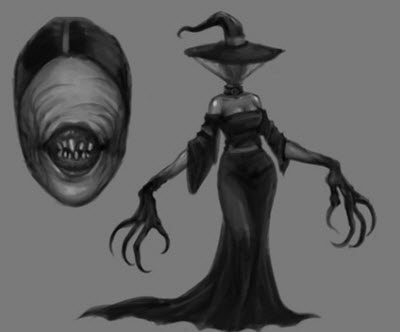GamesBeat: What kinds of questions have you gotten that have influenced you so far? You talked about a few of the changes, but what are some other fan-generated questions and responses you’ve seen?
McGee: They tend to focus on things like the name. There was an unusual amount of discussion around the title. There hasn’t been a lot of feedback, to be honest with you, around the game concept or the design that we’re using. It seems like the audience is more focused on the surface elements. They’re concerned about elements of the Kickstarter campaign, like how complex the tier system is, because they’re worried that’s going to somehow distract or confuse people.
But we have had a pretty interesting time working with the audience, even prior to launching the campaign, on things like defining how Dorothy was going to look. We went through an interesting process with the fans to get to a main character design that would represent her in the game. That was something they were very happy to be involved with, and it was fun for us to take direction from the audience to achieve that character’s look.
The hope, after getting this project off the ground, is that going forward we’re going to do a similar kind of involvement of the audience with all sorts of things – the character designs, how we end up refining the combat systems, how the camera presents itself in the world, other things like that.
GamesBeat: How large a game do you see this becoming compared to the effort you put into titles like Alice?
McGee: There’s a pretty significant difference. You have to keep in mind that the direct budget for Alice was around $8 million U.S. I think a lot of people don’t think about the scale of the budgets when they see a Kickstarter campaign like this where we’re asking for $1 million. There’s often a response for the audience like, “Oh my God, that’s a lot of money. There’s no way a game needs to cost that much.” People aren’t thinking about how for a traditional console title now, $8 million is on the low end. You know that budgets can get upwards of $20, $30, $40 million. There’s going to have to be a sort of recognition of that smaller budget in the design and how much content we produce.
But one of the comments we had about Alice is that it was too big, that it was too long, that it dragged on. I agreed with that. We created too much content and not enough gameplay to fill out all the space that was available to play in. That was a problem of too much money being spent on art and not enough time being spent on game design. When we go into something like Oz, that smaller budget doesn’t necessarily mean it’s going to be less of a game. We can make a game that is visually as interesting as Alice and that in fact plays in a much more engaging and consistent way. It doesn’t suffer from the same problems as Alice did, feeling too big or not tight enough.
GamesBeat: Have you thought about doing anything interesting yourself if the campaign succeeds? It’s a tactic that’s come up before with some developers.
McGee: You know, on the opposite side of that, a lot of times when I go to read comments on the gaming news sites, there’s a lot of animosity towards me. Maybe because people think I make terrible games, or because they don’t appreciate my name being associated with the games. I’m not sure. But one of the things I’ve joked about is running a Kickstarter campaign to get me out of the industry. Just tell all the haters, “Look, I’ll run a Kickstarter to help you help me buy a sailboat. I’ll sail off into the sunset and you’ll never hear from me again.” They can put their money where their mouths are. [laughs] But for this campaign, I haven’t thought of anything quite like that yet.
I did bring one thing up with my community manager. I was saying, if I told people this was my last game, maybe that would give an incentive to all the grumpy guys in the comments. But we haven’t actually decided on that yet.
I don’t know if you’ve seen it, but there’s a lot of negativity out there these days around Kickstarter. There also seems to be a growing amount of negativity towards developers in general. For me, there’s a sort of growing frustration at what seems to be a kind of warfare going on between audiences, developers, publishers, and platforms like Kickstarter.
GamesBeat: With Alice, I think you had an all American team, right? With this game, you’ll have an all-Chinese team. Is there a challenge in that?
McGee: There were two Alice games. There was the first game, almost 12 or 13 years ago, that was produced by a team in Texas. You could say they were all American. But the last game, Alice: Madness Returns, was produced all here in Shanghai. I’ve been out of the U.S. now for almost 10 years. Spicy Horse has been here for seven years. In the last seven years, everything I’ve produced has been here in Shanghai with a predominantly Chinese team.
To your question about whether there’s a challenge, I think that game development is difficult no matter where in the world you might try to attempt it. We’re using the same production methodologies and the same technologies and the same kinds of thinking when we approach designing and developing our games that you would use anywhere in the world.
Keep in mind, when you’re there in the U.S. playing games on a PlayStation or an Xbox that was made by Activision or EA or Ubisoft, the content that you’re playing is made in China. They all have 3D animation and other outsourced studios here in China. Many of them are here in Shanghai. You’re already playing Chinese-made games on your Chinese-made Xbox 360 or PlayStation 3.
That’s another thing a lot of people seem not to get. So much of what you’re playing is connected to China, no matter where you’re playing it, and yet when we talk about being in China, oftentimes people will comment that it’s wrong that I left in the U.S., or that I’m engaged in some sort of evil outsourcing business. They’re not thinking about the reality of the global economy that we live in. The western games industry is very much dependent on content coming from China.
GamesBeat: Do you have anything else to add?
McGee: The main thing is that we’d love to have people come over to check out the Kickstarter campaign. If they want to, they can interact directly with me and with our community – if they have questions with OZombie, or whatever we end up calling it, and what we’re doing in China.
VentureBeat's mission is to be a digital town square for technical decision-makers to gain knowledge about transformative enterprise technology and transact. Learn More




